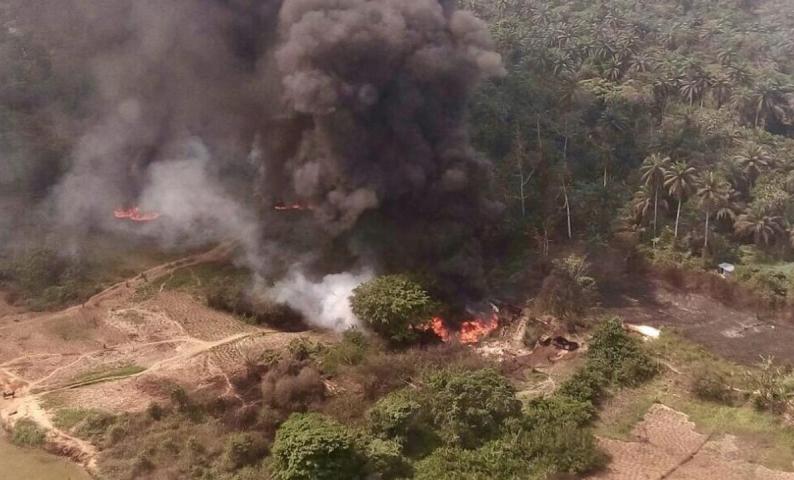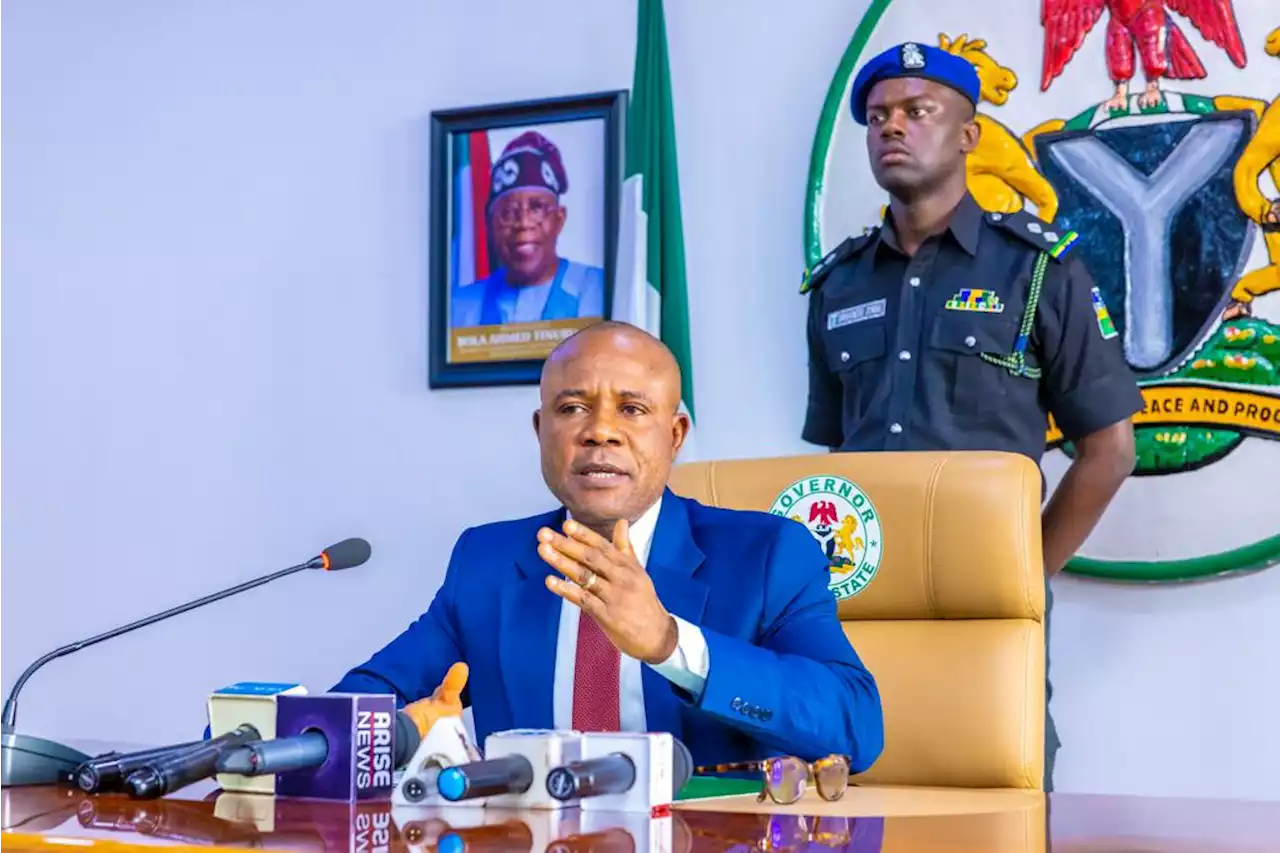NEWS
Why We Have Cybercrimes Upsurge in Nigeria – Authors

From Mike Tayese, Yenagoa
The Minister of State for Police Affairs, Imaan Sulaiman Ibrahim, has promised to draft Dr. Tombari Sibe and Prof. Christian Kaunert, who recently launched a book, Cybercrime, Digital Forensic Readiness and Financial Crime Investigation in Nigeria’, into Federal Government’s Committee on National Policing Policy.
Sibe, who is a lecturer in the Department of Computer Engineering, Rivers State, University, is a Cybersecurity/Digital Forensic expert, with over two decades of professional experience in Information Technology Consulting while Kaunert is Professor of International Security in the School of Law and Government, Dublin City University, Ireland.
The Minister insisted that experts like Sibe and Kaunert were needed in the committee, which she said was under formation.
She said the authors would provide inputs on cybersecurity frameworks for the Nigeria Police Force (NPF).
The minister, who was represented by her Senior Technical Adviser on Policy and Strategy, Mike Imafidor, during the book launch, said the ministry was focused on driving police reforms through the integration of advanced technologies.
The Minister said: “Another significant element is the development of a national policing policy, with the committee currently being formed.
“We will extend an invitation to Dr. Sibe and Professor Kaunert to join the committee, particularly in the section focusing on cybersecurity and technology adoption within the NPF.
“The aim is to establish a framework for technology integration, avoiding isolated systems that are difficult to connect and ensuring smooth interoperability.The goal is to create a policy that guarantees the sustainability of these technological efforts”.
Sibe in a statement made available to our correspondent confirmed the development saying the book addressed the country’s unique challenges and presented a comprehensive plan for forensic readiness to fill a gap in the country’s cybersecurity infrastructure.
He said: “Most often, we look at human forensic capabilities only from a budgetary perspective—how much do we have in the budget? How much can we plan for building this registry? But we often don’t take a long-term view in terms of building financial readiness, operational readiness, or any other kind of readiness we need.
“A key outcome of this study is to establish a clear, articulated roadmap for building forensic readiness. Another important contribution is identifying knowledge, skill gaps, and training needs.
“We spoke to some of the top cybercrime investigators in this country, and special thanks go to the agencies that contributed. This allowed us to pinpoint the specific gaps that need to be filled.”
He said that the book further discussed cryptocurrency, artificial intelligence, and blockchain and highlighted the challenges and opportunities of such technologies.
Providing more insights on why they authored the book, Sibe said: “Nigeria has witnessed a surge in cybercrime incidents, and this has been quite disturbing. Apart from the financial loss suffered by victims of cybercrime, Nigeria as a nation also suffers from reputational damage.
“Despite spirited efforts by Nigeria’s law enforcement agencies, the caseloads continue to grow exponentially. This has left the nation with an unfortunate tag as one of the hotbeds of cybercrime.
“This has been further complicated by the lack of coordinated research on the actual dynamics and complexities of the cybercrime surge in Nigeria.
“Most of what we know about Nigeria’s cybercrime landscape is what is reported on the pages of the newspapers; but newspapers only tell a tiny bit of the story. So, the authors saw an obvious gap in lack of coordinated research on the nature of cybercrime in Nigeria.
“In filling this gap, we decided not just to rely on the easy part of harvesting and synthesizing mostly the anecdotal accounts from the open source, but to get a deeper perspective from the law enforcement agencies in the front lines of the fight against cybercrime. Therefore, this study was structured as a case study”.
On why cases of cybercrimes continued to increase in the country and the uniqueness of their new book, Sibe said: “One of these is the apparent lack of digital forensic resources by the cybercrime investigating institutions. While a few studies have highlighted the lack of forensic resources among financial crimes institutions in Nigeria, no study had investigated in detail the specifics of this lack, and the impact on financial crimes in Nigeria.
“In addressing this, this book investigated this from a law enforcement point of view. Specifically, the authors investigated the digital forensic readiness of the two leading institutions, responsible for investigating and prosecuting financial crimes in Nigeria—the Economic and Financial Crimes Commission (EFCC) and the Nigeria Police Force.
“Good knowledge of the scale and scope of the lack of digital forensic resources is an essential first step to developing a digital forensic readiness model or digital forensic capability maturity model, and this book attempted to provide this foundational knowledge”.
Sibe, who is also a Visiting Fellow of the University of South Wales, United Kingdom, noted that the book also investigated the specifics of the caseloads and conviction records and looked out for trends and patterns supporting or refuting them.
He said the book further probed other cybercrime complexities in Nigeria, such as common cybercrime taxonomies, prosecution, and conviction dynamics, juxtaposing it with select case studies in other jurisdictions.
He recalled that the journey to the book started in 2019 when he was doing a Ph.D at the University of the Cumberlands, USA.
He expressed their gratitude to the EFCC, the Nigeria Police Force for their assistance as well as other institutions that supported the research work.
NEWS
21 Terrorists Neutralised in Damboa Again — Army

Troops of Operation Hadin Kai (OPHK) have repelled a deadly attack by ISWAP terrorists in Damboa, Borno, neutralising 21 insurgents and recovering a cache of arms and ammunition.
Capt. Reuben Kovangiya, Acting Deputy Director, Army Public Relations, Headquarters Theatre Command, confirmed this in a statement issued in Maiduguri on Friday.
Report saya that the attack, which occurred in the early hours of Friday, targeted troops of the 25 Task Force Brigade.
Daily Asset, however, reports that the soldiers, with the support of the Air Component of OPHK, engaged the terrorists in a fierce and prolonged firefight that lasted over two hours.
Kovangiya said the troops displayed gallantry and tactical superiority during the confrontation, forcing the terrorists to retreat in disarray, leaving behind more than 21 of their fighters who were neutralised during the engagement.
“The gallant troops, supported by Close Air Support, stood their ground and repelled the attack despite the ferocity of the enemy.
“The insurgents suffered devastating losses and were forced to flee,” he said.
The spokesman said that during the exchange of fire, an ammunition storage facility within the military formation was hit by a blast, but the situation was quickly brought under control.
He also confirmed that the troops recorded minor casualties.
“Following the mop-up and exploitation operation, the following weapons and ammunition were recovered:
“Two General Purpose Machine Guns (GPMG) three Rocket Propelled Grenade (RPG) tubes, one pump-action rifle, nine AK-47 rifles, three belts of PKT rounds, eight AK-47 magazines, seven RPG bombs, two boxes of 12.7mm x 99mm ammunition, one and a half box of PKT rounds and 20 pieces of 36 hand grenades,” Kovangiya said.
The spokesman said that the success of the operation was a clear demonstration of the effectiveness of joint land and air efforts in counterterrorism operations which further reaffirmed the Nigerian military’s resolve to restore peace in the North-east.
“The bravery and sacrifice of the troops remain a symbol of national pride.
“Their unwavering commitment to defeating insurgency and restoring peace in the region is commendable,” he said.(NAN)
NEWS
Enugu Govt Sets up Human Development Council

Gov. Peter Mbah of Enugu State, on Friday, inaugurated the Enugu State Human Development Council at the Government House. He stressed that human capital remains the true wealth of any nation and a core priority of his administration. The Council is chaired by the Deputy Governor, Ifeanyi Ossai, and includes State Executive Council members and heads of MDAs.
Also represented are the legislature, local governments, traditional rulers, church leaders, and civil society organisations. Mbah explained the Council aligns with his government’s emphasis on human development and social investment. He urged the members to take the task seriously and work towards tangible outcomes. “One of our top priorities is eradicating poverty and reducing the poverty headcount to zero,” Mbah noted. He added that the government’s philosophy prioritises human capital over natural resources. “Our last two budgets allocated over 50 per cent to social services,” the governor stated. In his response, Ossai assured the governor of members’ commitment to the Council’s goals. He emphasised that all government initiatives — from schools to roads — are people-focused. “All our projects aim to improve lives, and the Council will help us track and measure progress,” Ossai said. (NAN)NEWS
ASUU Demands Action, Threatens Nationwide Strike

The Academic Staff Union of Universities (ASUU) has urged the Federal Government to honour the 2009 FG/ASUU agreement or face a nationwide industrial action. ASUU President, Chris Piwuna, issued this warning during a news conference in Abuja on Friday. He stressed the importance of the government fulfilling its promises and addressing the worsening conditions in Nigerian universities.
According to Piwuna, nine critical issues remain unresolved, including the stalled renegotiation process since 2017. He mentioned withheld salaries from the 2022 strike and unpaid entitlements linked to the contentious Integrated Payroll and Personnel Information System (IPPIS). Piwuna also criticised the delayed release of revitalisation funds and earned academic allowances due to government inaction. In spite of promises to inject ₦150 billion into universities and adjust irregular allowances by 2026, he said these commitments remain unfulfilled. He highlighted the marginalisation of ASUU members at state institutions such as Kogi State University and Lagos State University. According to him, victimisation, salary denial, and job insecurity persist in those universities, undermining staff morale. On university autonomy, he said political interference has compromised the selection of leaders, citing Nnamdi Azikiwe and Abuja universities as examples. Piwuna warned that universities are becoming battlegrounds for political and economic interests, which he described as unacceptable. He called for a national rebirth through education, saying it is vital for Nigeria’s transformation and prosperity. To address the crisis, he proposed a national education summit focusing on funding, autonomy, and academic welfare. “Education empowers citizens, drives innovation, and instils values. Without it, development is impossible,” Piwuna said. He reaffirmed ASUU’s commitment to reforming Nigerian universities and urged patriotic Nigerians and global allies to support their struggle. “Our universities should be centres for solutions to national challenges. “We are open to dialogue but will not tolerate further erosion of our rights,” Piwuna said. (NAN


















